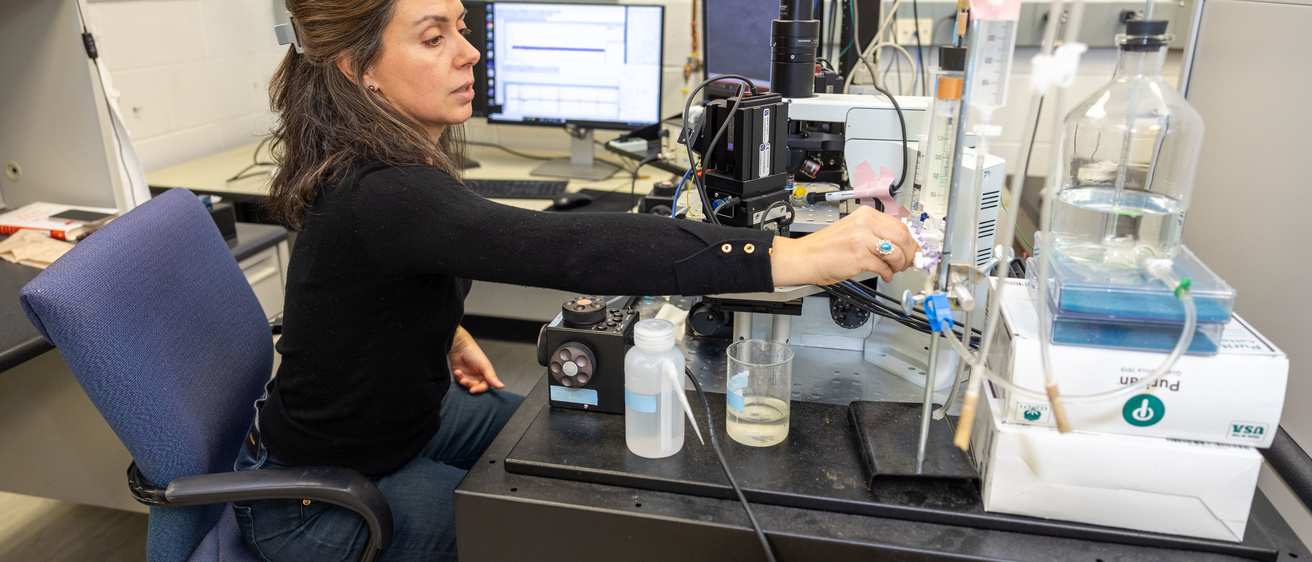One University of Iowa faculty member’s research on how drugs affect the brain’s function has been recognized on a national stage.

Stephanie Gantz, Carver College of Medicine assistant professor in molecular physiology and biophysics, was named one of the 2024 Sloan Research Fellows by the Alfred P. Sloan Foundation. The honor, one of the most prestigious awards given to early-career scholars, was given this year to 126 scientists across the U.S. and Canada. Fellows receive $75,000 to be used to support their research.
Since the Sloan Research Fellowships were first awarded in 1955, 13 UI faculty have received the award, including Gantz.
“When I was going through my training, very few women were in the position that I have now,” Gantz says. “I often hope that I am creating something that people can look up to and see themselves doing. I want other women to see they can have a career without having to be anything other than exactly themselves.”
Gantz was nominated for the Sloan Research Fellowship by Kevin Campbell, professor and chair of the UI Department of Molecular Physiology and Biophysics. Campbell says the department is excited to have Gantz among its faculty, and he anticipates Gantz will be a recognizable leader in neurophysiology.
“Stephanie Gantz is an outstanding early-career investigator in neuroscience who has made several landmark discoveries that have revolutionized the understanding of how the brain creates signals,” Campbell says. “Her research is often regarded as creatively simple and clever, combining time-honored techniques with new and innovative approaches.”
Gantz, who grew up in Montana, received a bachelor’s degree in biology from Reed College and a PhD in neuroscience at Oregon Health and Science University, both of which are in Portland, Oregon. She completed postdoctoral research at Harvard Medical School and National Institutes of Health.
Gantz says her research began when she was an undergraduate student and saw the challenges the country was having with methamphetamine use.
“I was really taken by how incredibly damaging drug abuse and substance abuse can be to individuals, families, and society,” she says. “I was quite interested in the neuroscience mechanics of substance abuse. That was my first research experience as an undergraduate, studying changes in the brain from early exposure to drugs and substance abuse.”
Gantz continued her research through her postdoctoral work. She then came to Iowa in 2020, opening her lab amid the COVID-19 pandemic. The lab’s focus is on monoamine neurotransmitters, which are involved in regulating brain chemicals such as dopamine, serotonin, and adrenaline.
“We focus on what makes drugs so addictive and what we can do to help people,” Gantz says. “From there, I started to realize if we didn’t have a solid understanding of the brain under healthy conditions, we cannot begin to understand the brain under unhealthy conditions.”
Gantz says her lab looks at understanding electrical activity in single brain cells, a process she called “electrical eavesdropping.”
“We listen to see if the cells are responding, apply drugs, and see if it alters communication in the brain,” she says. “It’s a fun technique. It’s still observational science, where we listen and watch what the brain circuits are doing and how they are behaving to make conclusions on larger networks in the brain’s function.”
Gantz says she has been working to secure funding for her own research program so she can spend more time in the lab conducting experiments. She also credits the UI and the Department of Molecular Physiology and Biophysics for helping her succeed and says the Iowa City community is a perfect place for her.
“I attended an early career webinar when I started, and someone said, ‘Successful people at Iowa put down roots in the community,’ and that really stood out for me,” she says. “I moved here without friends or family, and I have made a rich network of support. This place has everything we could need to be successful, and I spend a lot of time trying to convey that to people. I had my training on the coasts, but I hope to be a spokesperson for how amazing it is here at Iowa.”
